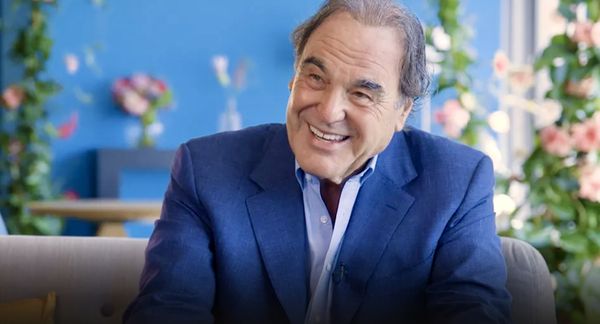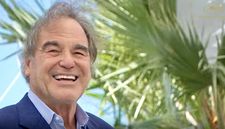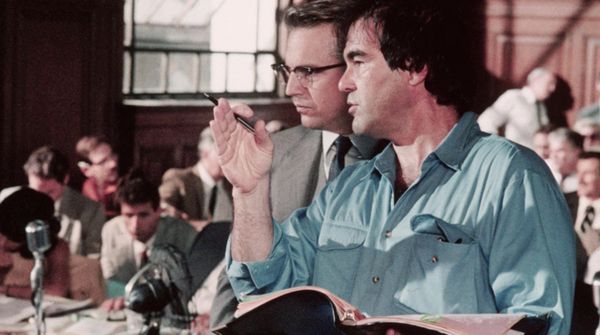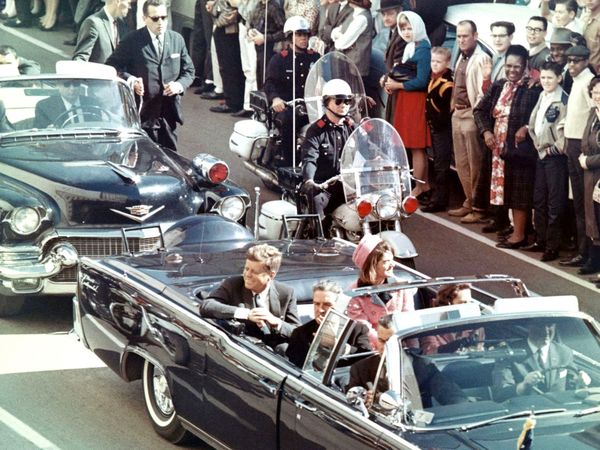 |
| Renegade director Oliver Stone at the Cannes Film Festival: 'The original JFK probably was the most controversial film of my career' Photo: Courtesy of Cannes Film Festival |
Stone, 30 years after the film was released, remains unrepentant and returns to the subject in a new documentary JFK Revisited: Through the Looking Glass, which was premiered at the Cannes Film Festival alongside a newly minted and longer director’s cut of his original take on the subject.
 |
| Oliver Stone: 'I don’t deliberately stir it up, you know. I go where my heart takes me' Photo: Courtesy of Cannes Film Festival |
Stone, 74, and his producer Rob Wilson suggest it is known now for certain that the accused gunman Lee Harvey Oswald was not in the book depository where he was alleged to have fired the shots that killed the president. At a media gathering Stone confirmed: “We know that the original evidence the Warren Commission presented us with - the bullets, the trajectories, the rifle, the autopsy - are fraudulent.”
He suggested that the motive was change. “It was felt that Kennedy was changing things too much. Since Kennedy no American president has come close to shaking things up in the same way. We now have a military sector that consumes 50 per cent of our budget. It’s outrageous. We can’ touch the military. We can’t touch the intelligence agencies.”
The documentary assembles teams of medical and ballistics experts, historians, and witnesses with Stone narrating together with Donald Sutherland and Whoopi Goldberg.
As well as the documentary Stone was energised to be able to revisit his original film. “It is now some three hours and 29 minutes - 18 minutes longer than the original. I was able to put back things that I had had to cut. My original contract in 1991 was for a three hour movie or less, but Warner Bros liked it so much that they allowed me to go to three hours and ten. In those days it was more difficult to do a long movie, whereas today it would be more acceptable. I liked both versions,” he said.
 |
| A youthful Oliver Stone directs Kevin Costner in JFK Photo: Warner Bros Pictures |
JFK was nominated for eight Oscars, including best picture, and won two. It grossed more than $200 million, and starred Kevin Costner as the New Orleans district attorney Jim Garrison.
Stone continued: “It was my producer Rob Wilson who started with me as an intern, who came up with the idea that we do a documentary drawing on all the subsequent documents about the assassination and also to draw on the original evidence. We had enough material for a four-hour project which we may come back to.
"It was a very important time in my life as a young man. Kennedy’s death lead to among many things the Vietnam War. He had been about to change Vietnam policy but also attitudes to Cuba and Russia. Kennedy was the last American president who really struggled for peace in the world. He signed the nuclear test ban treaty with the Russians which is still in effect. He was looking for peace with Cuba, yet the embargo still is in place after 60 years. He was seeking good relations with Asia, China, South America and Africa. What American president has done that consistently since then?
“After 1963 American went far to the right. The original JFK probably was the most controversial film of my career. I did not think it was going to be such a big deal, but it was seen all over the world. The Assassination Records Review Board was established as a result of the film.”
Stone stressed that JFK was not fiction but a dramatisation of the facts and the narrative he claims was “pretty accurate.” If Kennedy had succeeded in his course of actions “we would be in a whole different place today.”
The eternal renegade had a privileged, middle-class upbringing in New York with his French mother and American Jewish father, but spent most of his earlier years trying to shake if off. He claims his adolescence was stormy and anti-social which he describes in his book Night Dream. “I was a confused loner who took a very long time to learn how to fit in,” he admits.
One of the ways was to drop out of Yale, join up, and go off to Vietnam in the US Merchant Marine. Then he volunteered for the Army. He was shot at and injured on a tour of active duty, picked up a Purple Heart and a Bronze Star for bravery before returning to chill out in Greenwich Village. That meant smoking a lot of pot and behaving badly before he received a place in the early Seventies on the film course at New York University. Martin Scorsese was there at the same time as a course tutor.
His first big break was when he wrote Midnight Express featuring Brad Davis as the American held in a Turkish jail on a drugs charge. Stone won a surprise Oscar. His first film as a director, Salvador, an indictment of American foreign policy, was graphic and spared no punches. The late critic Pauline Kael joined the ranks of Stone detractors by suggesting that he had “jacked up the nobility of human suffering. He’s working outside the industry in Hollywood, but he’s got all this Hollywood muck in his soul”.
Then he made Platoon which became one of the biggest grossing films in the States in 1986 which paved the way for more American introspection and soul bearing and the confrontation of failures and fears.
Recently Stone has taken to interviewing some of the world’s most controversial figures including Vladimir Putin, Fidel Castro, Hugo Chavez and the former Kazakhstan leader Nursultan Nazarbayev.
The JFK documentary has been financed by a UK-based company Ingenious Media and it is to be released and sold by Altitude. Stone believes that Americans are too reticent about “owning up to our history.” For his whistle-blowing saga Snowden in 2016 he found the money in France, Germany and Italy.
He once told me: “Money is not the only thing to think of. Unfortunately in this business you have to do well to keep going and to be allowed to make movies like Wall Street or Nixon or JFK which embrace big themes and ideas. I like also to do small films, but when I do I am judged as if I had made a 60million dollar movie. I don’t deliberately stir it up, you know. I go where my heart takes me, and hopefully that will coincide with public interest. You never can tell.”
 |
| Oliver Stone reconsiders the assassination in JFK Revisited: Through The Looking Glass Photo: Photo Altitude |





















